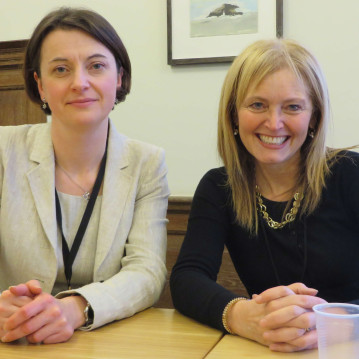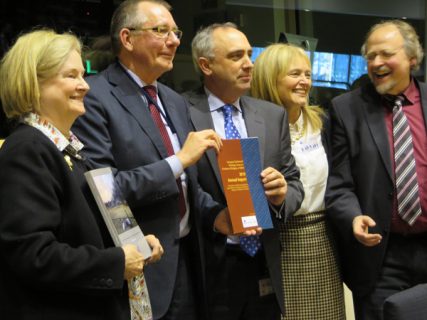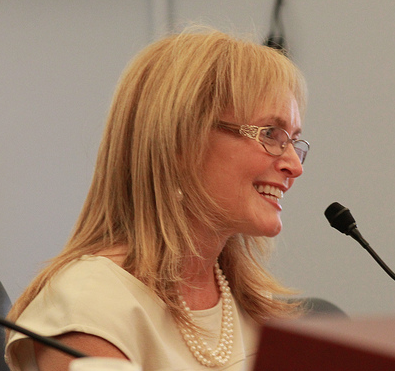
Baroness Elizabeth Berridge, chair of the all-party parliamentary group on international religious freedom (left) and Katrina Lantos Swett, vice chair of the U.S. Commission on International Religious Freedom
I met up with Katrina Lantos Swett, vice chair of the U.S. Commission on International Religious Freedom, and Baroness Elizabeth Berridge, chair of the U.K. All-Party Parliamentary Group on International Religious Freedom, near the Houses of Parliament in London last month to discuss how the two countries plan to work together in promoting religious liberty. Here’s Lantos Swett’s side of the conversation. I’ll post excerpts from Baroness Berridge soon.
Lantos Swett describes religious freedom as a canary in the coal mine, one governments and societies ignore at their own peril. Unlike domestic issues around religious freedom, which she calls “tricky and sticky,” Lantos Swett thinks international religious freedom concerns, like those President Obama addressed in his National Prayer Breakfast speech last month, can be unifying.
USCIRF is an independent, bipartisan government commission established in the 1998 International Religious Freedom Act. This interview has been edited for length and clarity.
Brian Pellot: Why is USCIRF branching out to work with more international governments on religious freedom?
Katrina Lantos Swett: We’ve been working hard to elevate the status of religious freedom as a key goal and priority in American foreign policy since the International Religious Freedom Act was passed 15 years ago. There’s no doubt that the problem is growing, not shrinking. 75 percent of the world’s population live in countries that moderately or severely restrict religious freedom. When the U.S. seems to be the only one out there on this religious freedom limb, it hampers the effect we can have. Working together will help us amplify these efforts.
At USCIRF, we see religious freedom as a very positive counter-narrative to the “clash of civilizations” notion that the world is divided between countries that embrace certain liberal values and freedoms and those that go against those values. Religious freedom is something all countries have signed on to in various international treaties. It really has the potential to be a very unifying human rights cause around which very different nations can rally.
The goal is to establish a coalition, a global caucus if you will, across continents, countries and faith communities, bringing together those who share a passionate commitment to the fundamental principle of religious freedom. Building the international nature of the movement will build momentum for this kind of coalition.
BP: I know that the U.S., the U.K. the E.U. and Canada all have special teams working on religious freedom. How do you plan to bring non-Western governments into the fold?
KLS: It’s incredibly important to broaden the community of countries that sees the advancement of this right as being in their national self interest. It’s certainly a harder lift in places like Pakistan. We all saw what happened to Shahbaz Bhatti. Here was an advocate of greater tolerance, of reforming Pakistan’s draconian blasphemy laws, and he was assassinated. The prosecution of his murderers is falling off the rails because of death threats to key witnesses and his brother had to flee Pakistan amid death threats. Finding partners in tough places will become easier as we build a coalition in countries where it’s easier for people to work on these issues.
Where we have partners in regions outside the West, we absolutely want to strengthen those relationships, but we also want to get as much of Europe on board as possible. Europe is important for many reasons including the fact that it’s engaged in aid programs and foreign relations around the world. We want to bring everyone on board.
BP: Some argue that government-backed freedom of religion efforts privilege certain faith groups over others and lock individuals into particular faith categories and identities. How do you respond to opponents of USCIRF’s efforts?
KLS: Drawing boxes around people is pretty much the antithesis of what we’re all about. Freedom of religion or belief as envisioned in Article 18 of the Universal Declaration of Human Rights is simple, clear and comprehensive. It is oriented towards the individual’s right to live according to the dictates of one’s own conscience, not towards group rights or the protection of religious communities.
Having been part of USCIRF for two years, I can tell you there are hundreds of individuals and dozens of advocacy groups, NGOs and faith communities that would be very sorry to see our government step away from this cause. The criticism we get from many of those individuals and groups is that we’re not doing enough. I have yet to encounter anyone who says our efforts are counterproductive. I think opponents of our work misconceive what we’re all about and probably haven’t had the sort of contact we’ve had with diaspora groups, faith communities, exiled pastors, family members of imprisoned or persecuted individuals and democracy activists.
It’s not just those from the religious community who come to us. Others recognize that freedom of religion is a canary in the coal mine. If a country begins to restrict religious freedom, you can be sure that freedom of the press, association and expression are not far behind. USCIRF’s director of policy and research Knox Thames has referred to freedom of religion as a bundled right. It’s so intertwined with these other essential components of democratic life.

Left to right, Commissioner Mary Ann Glendon of U.S. foreign policy positions toward religious freedom; Dennis de Jong and Peter van Dalen, co-presidents of the EU working group; Katrina Lantos Swett, vice chair at USCIRF; and Heiner Bielefeldt, the United Nations’ special rapporteur on freedom of religion, pose for a photo during their meeting in Brussels on Wednesday (Feb. 12). RNS photo by Brian Pellot
BP: Why is USCIRF proposing this global caucus on religious freedom? Why not the U.N.?
KLS: The U.N. special rapporteur on freedom of religion or belief is woefully undersupported. He’s a very dedicated, knowledgeable and impressive individual but basically functions on his cell phone and out of his suitcase. He shares one part-time staff support person and has no real budget. His own time is completely uncompensated, so he has to maintain a full-time professorial teaching schedule to keep body and soul together. Clearly it ain’t getting done there, not through any lack of commitment or competence, but due to a lack of dedicated resources and because there hasn’t been as active or mobilized a parliamentary constituency for this issue.
It’s been easy for governments, when push comes to shove, to give religious freedom the shove and to push something else to the fore. I don’t think there’s any strong constituency against advocating for religious freedom, but we need to create a strong movement in favor of it. It’s going to be very hard for my country to solve some of our most entrenched foreign policy and national security problems if we don’t help some really problematic countries figure out how to get this piece right.
As long as there are societies in which tremendous numbers of citizens are persecuted and communities are religiously cleansed or pushed underground, we’re going to see the seeds of social division, extremism and violence, all of which are incompatible with strong democratic values and functioning. Those problems end up coming to our shores, sometimes in the form of terrorism, which is obviously a huge issue of concern in our country and one that has absorbed vast resources to combat. With a diversion of a very tiny fraction of those resources towards promoting and building organizations and communities and leadership in other countries, we will strengthen this public space for religious freedom and yield tremendous results. We need to do it the right way, not from the outside but by finding ways to help individuals and communities change their own societies for the better.
BP: President Obama’s speech at the national prayer breakfast focused almost exclusively on international religious freedom concerns. Why didn’t he address domestic issues?
KLS: We were thrilled to hear the president’s very strong focus on international religious freedom, which I think reflects a growing awareness on the part of our country that religious freedom is not just a nice idea that we want to pursue because it makes us feel good. Increasingly, hard-nosed policymakers are coming to recognize that economic development, conflict resolution, women’s rights and educational advancement will not be as efficacious at the end of the day if we have a global society riven by religious division, persecution and cleansing. These are poison pills on the road to greater progress, democratization and advancement. We ignore religious freedom violations at our peril. The president’s speech reflected a growing awareness that we can’t afford to do that.
Domestic issues of religious freedom are tricky and sticky. They’re difficult because they involve trying to find accommodation between emerging social consensus on issues that touch on religious practice and Biblical teachings. There are religious freedom issues and problems domestically in the U.S., but they are not on the scale and the heartbreaking magnitude of what we see in so many other parts of the world. Those difficult domestic issues will be fought out domestically.
I really welcomed the president’s focus on international religious freedom because unlike some of the tough fights domestically, this is largely unifying. One of the best characteristics of USCIRF is its bipartisan nature. We always alternate our leadership on the commission between a Republican appointee and a Democratic appointee to underscore that these are not divisive issues, that these are issues that bring us together.
BP: When can we expect to see a new ambassador-at-large for international religious freedom?
KLS: The president indicated it will be soon, that it’s on his agenda. After the announcement it could take a while with the mechanics of the Senate approval process. The less controversial the nominee is, the less time it could take, but we’ll have to wait and see.
BP: I know the ambassador-at-large has a role at USCIRF. Does that mean you’ve been down a member since Suzan Johnson Cook resigned from the post?
KLS: The ambassador-at-large serves as a member of the USCIRF board but does not participate in the functioning, voting or report-writing process, so in that sense we are not down a member. In fact, we’re at full capacity for the first time in more a year and functioning well.
The day after our interview, Lantos Swett took her call for a global coalition on religious freedom to the European Union in Brussels. Read my story on that event and her remarks here.





